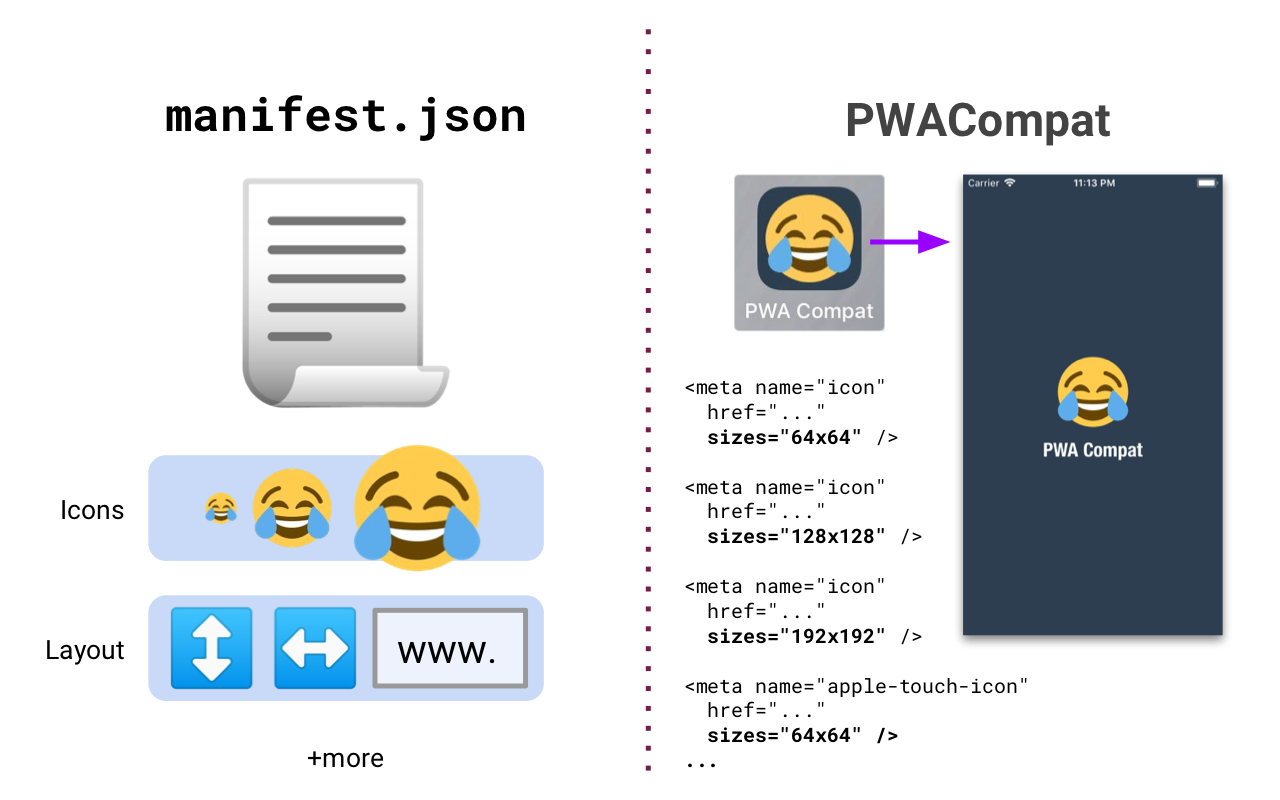PWACompat is a library that brings the Web App Manifest to non-compliant browsers for better Progressive Web Apps. This includes creating splash screens for Mobile Safari, and supporting IE/Edge's Pinned Sites feature.
So, if you've created a manifest.webmanifest but want to have wide support everywhere else—through legacy HTML tags for icons and theming—look no further.
Just include this script (or bundle/serve it yourself) in your page:
<link rel="manifest" href="manifest.webmanifest" />
<script async src="https://cdn.jsdelivr.net/npm/pwacompat@2.0.8/pwacompat.min.js"
integrity="sha384-uONtBTCBzHKF84F6XvyC8S0gL8HTkAPeCyBNvfLfsqHh+Kd6s/kaS4BdmNQ5ktp1"
crossorigin="anonymous"></script>And you're done! 🎉📄
For more on the Web App Manifest, read 📖 how to add a Web App Manifest and mobile-proof your site, watch 📹 theming as part of The Standard, or check out 📬 the Web Fundamentals post on PWACompat.
PWACompat takes your regular manifest and enhances other browsers
While PWACompat can generate most icons, meta tags etc that your PWA might need, it's best practice to include at least one <link rel="icon" ... />.
This is standardized and older browsers, along with search engines, may use it from your page to display an icon.
For example:
<link rel="manifest" href="manifest.webmanifest" />
<script async src="path/to/pwacompat.min.js"></script>
<!-- include icon also from manifest -->
<link rel="icon" type="image/png" href="res/icon-128.png" sizes="128x128" />Prior to iOS 12.2, Mobile Safari opens external sites in the regular browser, meaning that flows like Oauth won't complete correctly. This isn't a problem with PWACompat, but is an issue with PWAs on iOS generally.
If you specify a viewport tag which includes viewport-fit=cover, such as <meta name="viewport" content="viewport-fit=cover">, PWACompat will generate a meta tag that makes your PWA load in fullscreen mode, particularly useful for notched devices.
What does PWACompat actually do? If you provide a Web App Manifest, PWACompat will update your page and:
- Create meta icon tags for all icons in the manifest (e.g., for a favicon, older browsers)
- Create fallback meta tags for various browsers (e.g., iOS, WebKit/Chromium forks etc) describing how a PWA should open
- Sets the theme color based on the manifest
For Safari, PWACompat also:
- Sets
apple-mobile-web-app-capable(opening without a browser chrome) for display modesstandalone,fullscreenorminimal-ui - Creates
apple-touch-iconimages, adding the manifest background to transparent icons: otherwise, iOS renders transparency as black - Creates dynamic splash images, closely matching the splash images generated for Chromium-based browsers
For IE and Edge:
- Adds meta tags for the Pinned Sites feature
For PWAs on Windows with access to UWP APIs:
- Sets the titlebar color
Do you think PWACompat should support backfilling more HTML tags needed for older browsers? Let us know!
For a demo, try adding Emojityper or the demo site to an iOS home screen (to see splash screens and icons).
You can also install Emojityper from the Microsoft Store (where the titlebar color is automatically set the manifest's theme_color).
This is supported in most modern browsers (UC Browser, Safari, Firefox, Chrome, IE10+), and fails silenty when unsupported. Mobile Safari benefits the most from PWACompat, as generating a large number of splash screens manually is a complex task.
Your Web App Manifest is:
- normally named
manifest.webmanifest(although some folks name itmanifest.json) - referenced from all pages on your site like
<link rel="manifest" href="path/to/manifest.webmanifest" /> - and should look a bit like this:
{
"name": "Always Be Progressive",
"short_name": "Progressive!",
"display": "browser",
"start_url": "/",
"background_color": "#102a48",
"icons": [
{
"src": "res/icon-256.png",
"sizes": "256x256"
},
{
"src": "res/icon-128.png",
"sizes": "128x128"
}
]
}For more information on the Web App Manifest, and how e.g., modern browsers will prompt engaged users to install your site to their home screen, check out Web Fundamentals. There's also a number of online generators.
Compile code with Closure Compiler.
// ==ClosureCompiler==
// @compilation_level ADVANCED_OPTIMIZATIONS
// @output_file_name pwacompat.min.js
// ==/ClosureCompiler==
// code here
